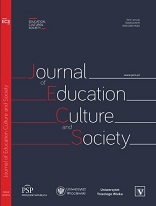Learning/teaching philosophy in sign language as a cultural issue
Learning/teaching philosophy in sign language as a cultural issue
Author(s): Andrea Benvenuto, António Magalhães, Orquídea Coelho, Maria de Fátima Sá CorreiaSubject(s): Semiotics / Semiology
Published by: Fundacja Pro Scientia Publica
Keywords: Bilingual education; Deaf culture; Learning-teaching Philosophy; Portuguese Sign Language
Summary/Abstract: This paper is about the process of learning/teaching philosophy in a class of deaf students. It starts with a presentation of Portuguese Sign Language that, as with other sign languages, is recognized as a language on equal terms with vocal languages. However, in spite of the recognition of that identity, sign languages have specificity related to the quadrimodal way of their production, and iconicity is an exclusive quality. Next, it will be argued that according to linguistic relativism - even in its weak version - language is a mould of thought. The idea of Philosophy is then discussed as an area of knowledge in which the author and the language of its production are always present. Finally, it is argued that learning/teaching Philosophy in Sign Language in a class of deaf students is linked to deaf culture, and it is not merely a way of overcoming difficulties with the spoken language.
Journal: The Journal of Education, Culture, and Society
- Issue Year: 4/2013
- Issue No: 1
- Page Range: 9-19
- Page Count: 11
- Language: English

